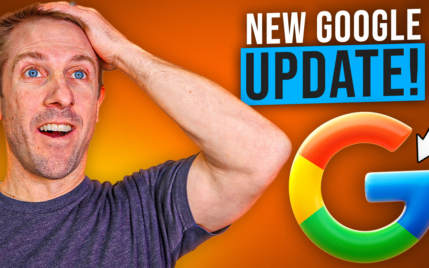Brand Ambassador vs Influencer: What’s the Difference and Which One is Better?

When you buy something through one of the links on our site, we may earn an affiliate commission.
If you've been looking into the influencer marketing industry you've probably come across the idea of brand ambassadors and thought the two were synonymous. They aren't. They're similar, but there are a few key differences regarding brand ambassador vs influencer which means one might be a better choice for you or your business.
Contents
Brand Ambassador vs Influencer: Summary of Key Differences

Social media marketing is one of the most powerful ways businesses can build brand awareness and encourage customer loyalty. Compared to traditional advertising, influencers and brand ambassadors have a better chance of coming across as more personal, resulting in higher conversion rates.
However, while both influencers and brand ambassadors are part of a social media marketing strategy, often the way they promote a product and the relationship they form with a brand can be very different.
Likely you'll find there is some overlap between the two terms but as a general rule of thumb, they differ in several key factors:
- Length of relationship. Brand ambassadorship often involves a long-term ongoing relationship with a brand. Social media influencers are more likely to do one-off promotions.
- Payment. Often, brand ambassadors have a genuine passion for the product and will promote it to their social media followers in exchange for little to no compensation. Comparatively, influencers create social media posts in exchange for monetary compensation. Sometimes an influencer will work for free products but not often.
- Way of promoting. Ambassador marketing is based on word of mouth and telling others about a product or brand. Influencer marketing focuses more on showing others what a brand or product can do.
- Type of content. Brands recruit brand ambassadors because they are true brand fans. They create content that it geared toward highlighting brand values. On the other hand, social media influencers attract people based on their personal brand. Therefore they create content to fit their personal brand, and outside brand values are secondary.
What is a Brand Ambassador?
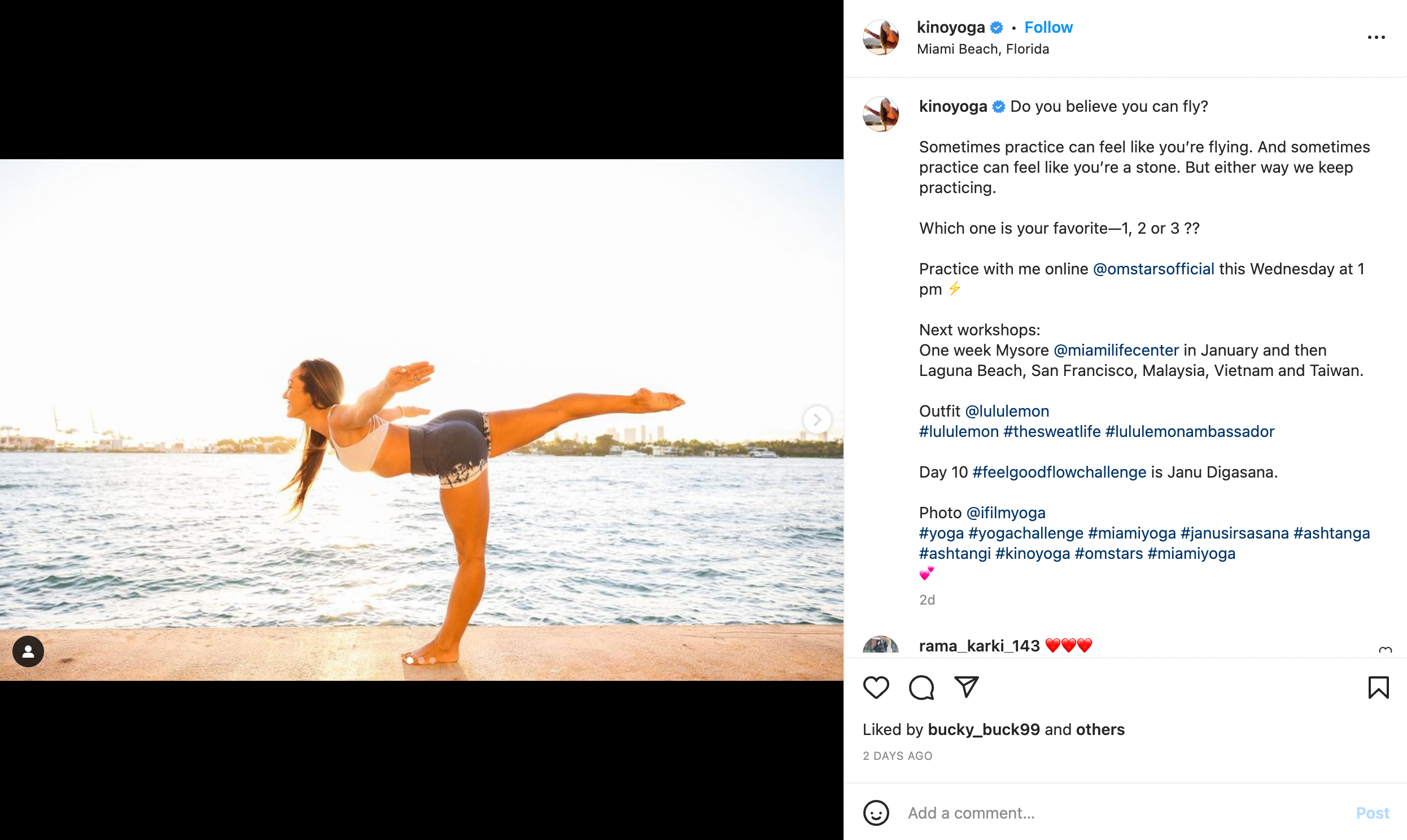
The best brand ambassadors are the ones that are already using their own voice to increase and build brand awareness for your business. These are your brand's true fans.
They will repeatedly promote your products positively through word of mouth. These individuals actively use your brand's product and can form intimate relationships with their social media followers.
For that reason, they normally don't have a million followers. They are more focused on building a tight-knit community and actively engaging with comments and potential customers for your brand.
When to Partner with a Brand Ambassador
Launching a brand ambassador program can be really beneficial for your business to increase brand awareness.
Unlike traditional ads, brand ambassadors tend to be motivated by helping their followers learn about a fantastic product rather than pushing a sale. This can make customers feel greater trust in the brand.
Additionally, brand ambassadors are particularly powerful for niche markets and premium products. This is because of the different ways brand ambassadors and influencers approach content.
Brand ambassadorship better highlights specific reasons a particular brand or product can help or improve a problem for potential customers. They are also more focused on becoming experts on your product and, therefore, better placed to share that knowledge with their followers.
If you want to form an ambassador marketing relationship, consider looking for social media posters already promoting your brand. This is the best way to find a reliable brand ambassador. Alternatively, you can open a brand ambassador program and accept requests to join.
Typically, brand ambassadors will work for very little compensation, so if you haven't got it in your budget to hire an influencer to reach your target audience, looking for a brand ambassador is a good approach to try and build your social media presence.
That said, most brand ambassadors get something in exchange for creating content to boost a brand. This can be free products, discounts, or exclusive perks.
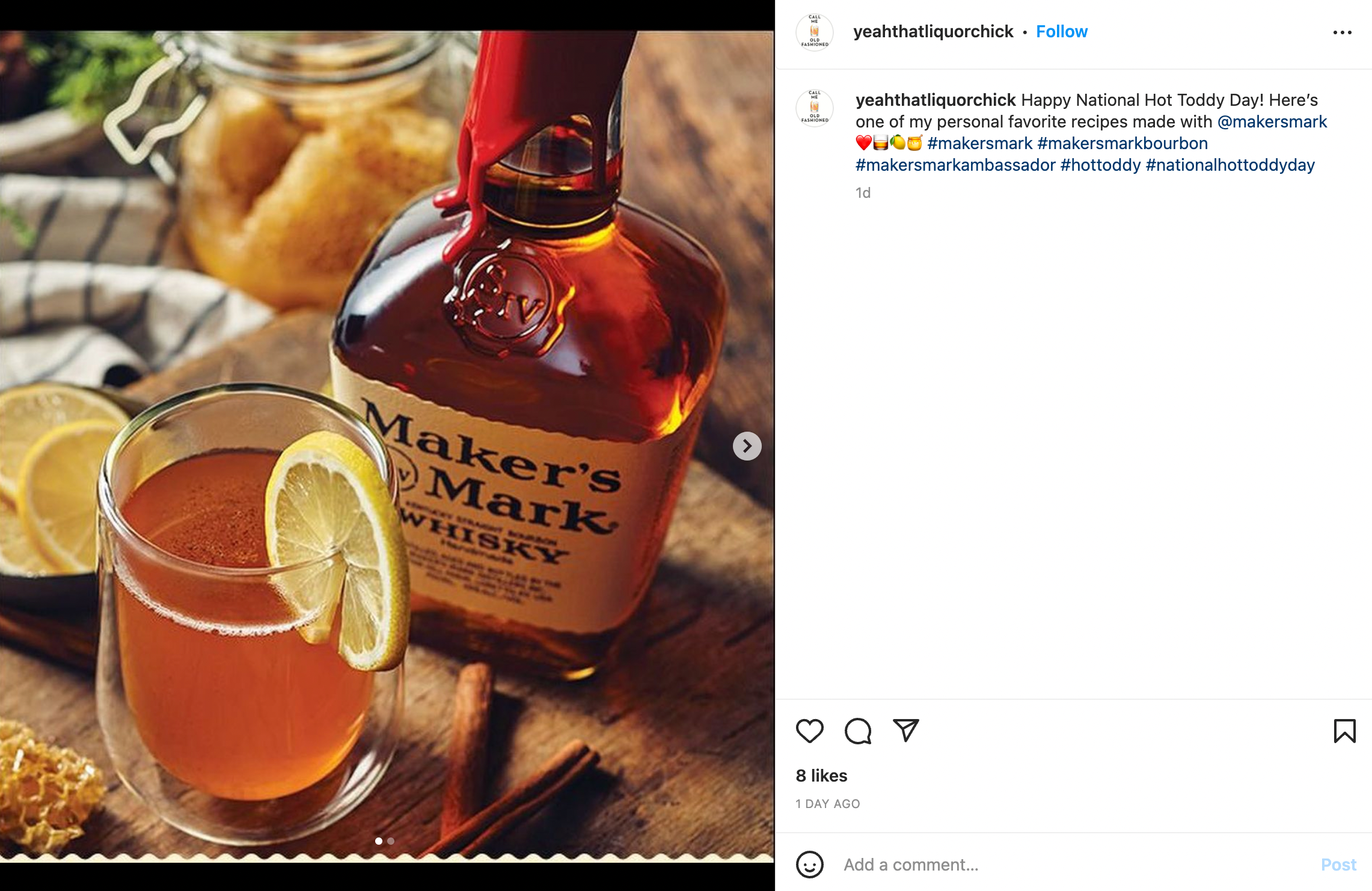
For example, Maker's Mark ambassadors receive early access to products, invites to special events, and their names on one of the barrels at Maker's Mark's farm.
Pro tip: Brand ambassadors agree that they are more motivated to write blog articles or post on social media when they feel a sense of community with the brand and other ambassadors.
How to Become a Brand Ambassador
To become a brand ambassador, you should consider your credentials first. A fitness enthusiast makes a more credible brand ambassador for Lululemon than a carpenter!
Beyond that, there are two primary ways to become a brand ambassador:
- Start as an unofficial ambassador. Start promoting the brand through word of mouth to your friends and family and across social media platforms. Reflect the brand's values and highlight all the reasons that you love their product. If you showcase a lot of passion for the brand they may come across your content when searching for a brand ambassador and approach you.
- Apply. The easiest way is to apply to join an existing brand ambassador program for a brand you already love.
Brand ambassadors should be experts in their industry. This means they can promote a product with all the insider knowledge that is needed to connect with potential customers.
They may not be professional content creators, but they will have strong communication skills that help them engage with others. And a brand ambassador can work both online and offline. Sometimes they will be asked to appear at events, so often, they excel at networking and representing the brand.
To learn more, check out our full guide on how to become a brand ambassador.
What is an Influencer?
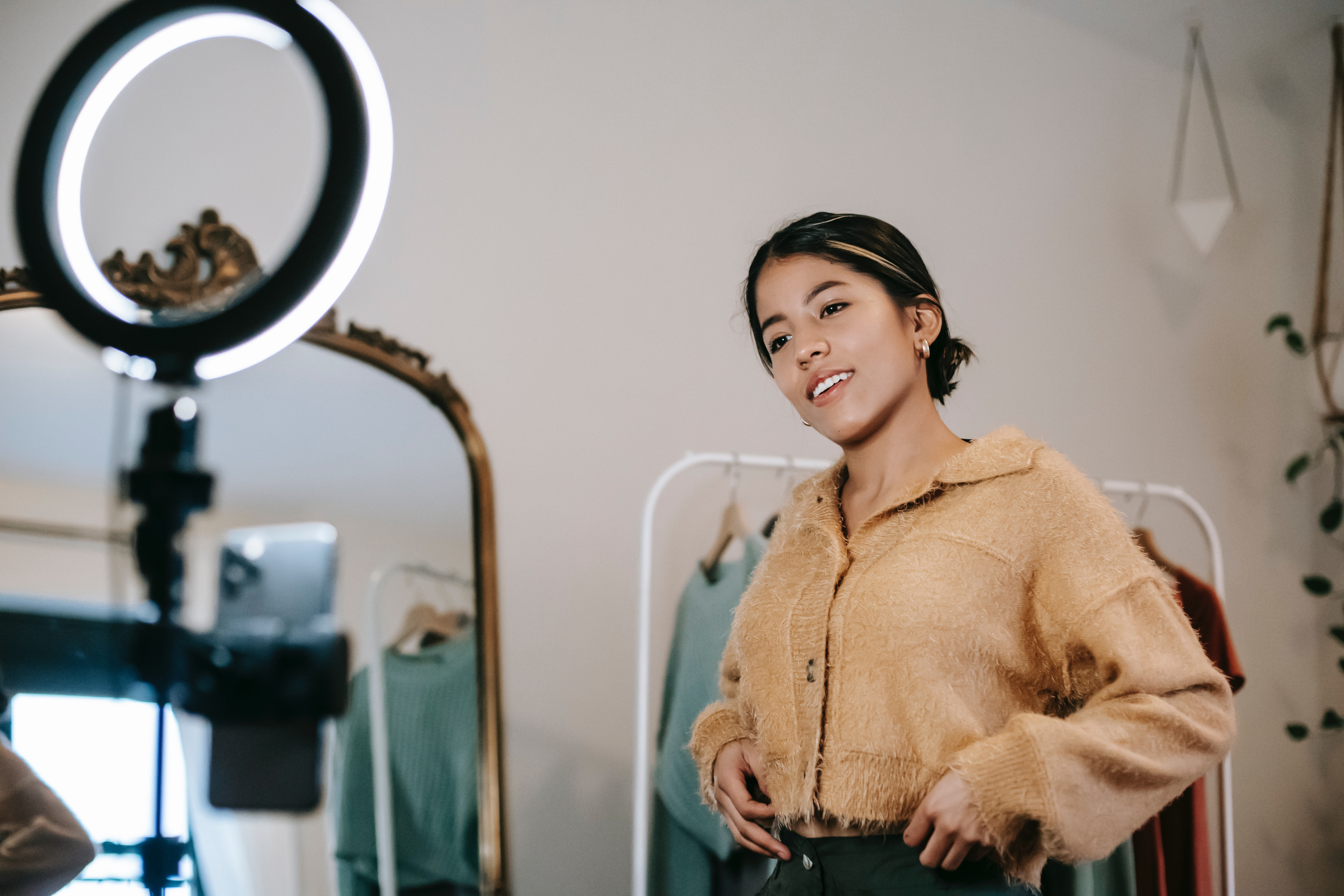
A major comparison between an ambassador vs influencer is the focus of their content. Influencers have built their following based on their personal brand, so their content will always be geared towards feeding that image.
To that end, influencers are a crucial part of today's marketing landscape. This is because, according to the Digital Marketing Institute, 60% of consumers would consider purchasing an influencer-promoted product if they saw it in-store, and 89% of consumers look for social media referrals when searching for a product.
Therefore, rather than spending money on traditional advertising, more and more businesses are setting aside a large portion of their marketing budget to pay for influencer marketing campaigns.
There are four main types of influencers:
- Social media stars: these individuals are like celebrities. They have a substantial social media presence and millions of followers. Social media stars usually have a wide reach but much lower engagement. They don't reply to most of their comments and don't have an intimate relationship with their followers.
- Macro influencers: these influencers might have as many as a million followers but not more. Often macro influencers have a following of a couple hundred thousand. They are the perfect middle ground with a decent reach and medium levels of engagement.
- Micro influencers: not all influencers have a massive following. Micro influencers are more focused on engagement and building authority in their niche. As a result, they form more intimate relationships with their following but won't have as wide a reach as social media stars.
- Nano influencers: a nano influencer has a strong reputation in their niche and high engagement levels but less than 10,000 followers. Their limited reach means they charge much less for their services.
When to Partner with an Influencer
Deciding what kind of influencer to work with will depend on your brand's desired reach and the goal of your influencer marketing relationship.
You should consider their industry reputation, following, and interaction with your target audience. Whether or not they have ever heard of your brand before does not come into play.
Partnering with an influencer can be a great way to generate hype around a product launch. Influencer marketing campaigns will also support other marketing strategies and can be used to increase brand awareness.
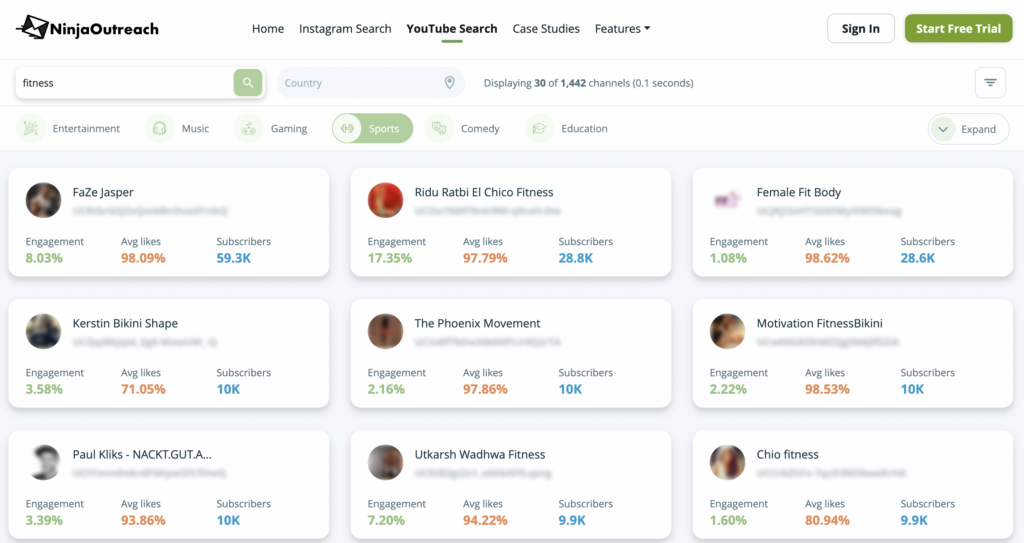
An easy way to find influencers is to search an influencer marketplace to filter by niche and following. Ninja Outreach is a great tool for searching influencers and tracking deliverables.
One of the main differences between an ambassador vs influencer is the compensation they receive. While brand ambassadors work for free, if you hire an influencer, you should be prepared to offer monetary compensation in exchange for their influence.
There are strict regulations about disclosing brand partnerships when an influencer creates a post in exchange for money. This is why you'll often see influencers post #ad or #sponsored.
A 2019 Edelman report shared that 63% of consumers trust an influencer's opinion on a product more than they trust traditional ads. This highlights the level of awareness that a strategic influencer campaign can bring to your brand.
Read over our guide on how to write excellent influencer contracts if you're getting ready to hire an influencer and don't know where to start.
How to Become an Influencer
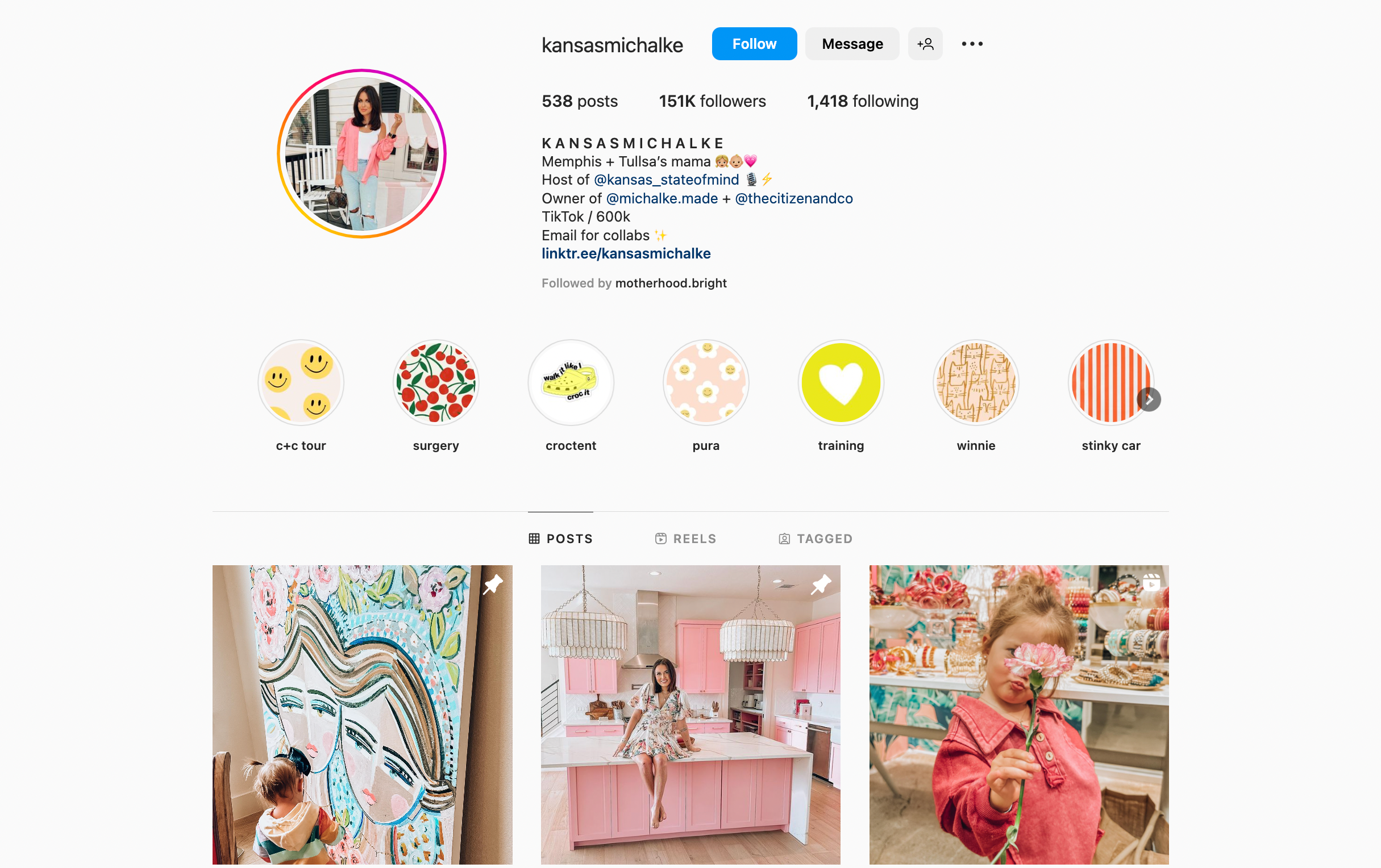
The first step to becoming an influencer is building your own audience. Most of the time brands are looking for influencers with a relatively large presence.
To be a successful influencer here are some key things to consider:
- Influencers and brand ambassadors have a different approach to content. Influencer marketing is about authentically showing your own followers how to use a product. It is focused less on word of mouth and more on show.
- Influencers don't usually make long term commitments to a brand in the way that brand ambassadors do. They will often promote a product only once or twice on a particular social media platform. So, influencers need to be flexible and ready to adapt.
- Influencers tend to be really good at following a certain aesthetic that appeals to a specific audience. They are masters at visual content creation and know how to leverage all social media platforms.
Once you've amassed a respectable following, there is a good chance brands in your niche might approach you. However, this isn't always true.
If you're eager to get your influencer career started, the best thing you can do is reach out to a brand you'd be interested in working with. Email a cold pitch and highlight what value you can bring to them.
Here's our step-by-step guide on how to become an influencer.
So, Which One is Better?
Influencers and brand ambassadors both play important roles in today's marketing landscape.
Influencer relationships are short term and they promote brands across social channels in exchange for compensation. Brand ambassadors represent brands online and offline for the long term and receive compensation through exclusive perks.
Most big businesses will have both brand ambassador programs and influencer programs since they fulfill different needs for the business. It's not about choosing one or the other. It's more about knowing when to employ which.
An influencer marketing campaign is a great way to introduce a new product to a large target audience (and you can check out our Social Cat review to learn how to contact them). When that short-term relationship is over, rely on your brand ambassadors to keep the buzz going.
If you're deciding between an ambassador vs an influencer for your career, remember that brand ambassadors don't make any money. But if you are truly passionate about a brand you'll be rewarded with perks and discounts. Influencers on the other hand, can charge between $10-$100,00 for a single post depending on the size of their following.
The good news is, you can be both. There's nothing stopping you from being an ambassador for a brand you love while also working as an influencer.
Want to learn step-by-step how I built my Niche Site Empire up to a full-time income?
Yes! I Love to Learn
Learn How I Built My Niche Site Empire to a Full-time Income
- How to Pick the Right Keywords at the START, and avoid the losers
- How to Scale and Outsource 90% of the Work, Allowing Your Empire to GROW Without You
- How to Build a Site That Gets REAL TRAFFIC FROM GOOGLE (every. single. day.)
- Subscribe to the Niche Pursuits Newsletter delivered with value 3X per week
My top recommendations













